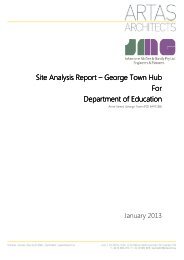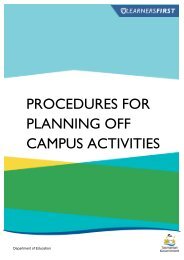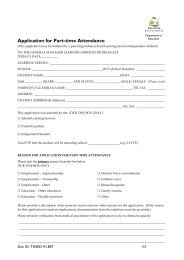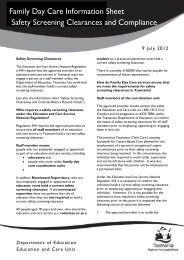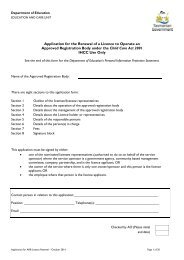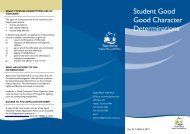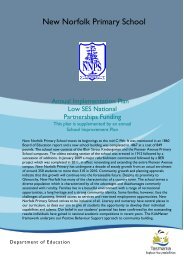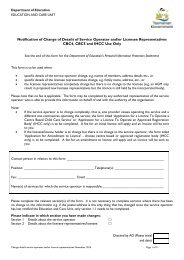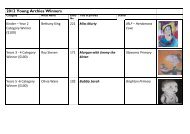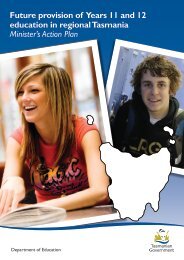Tas Curriculum K-10 - Languages - Italian - Department of Education
Tas Curriculum K-10 - Languages - Italian - Department of Education
Tas Curriculum K-10 - Languages - Italian - Department of Education
Create successful ePaper yourself
Turn your PDF publications into a flip-book with our unique Google optimized e-Paper software.
Standard one Standard two Standard three Standard four Standard five<br />
Pronouns<br />
Rehearsed use <strong>of</strong><br />
subject pronouns,<br />
especially io and tu<br />
Sentence & phrase types<br />
Questions and answers<br />
e.g. Che cos’è questo?<br />
Questo è un<br />
giocattolo; Come ti<br />
chiami? Mi chiamo<br />
Lucia; Come stai?<br />
Molto bene grazie<br />
Pronouns<br />
Incidental use <strong>of</strong><br />
subject pronouns,<br />
especially io, tu, lui, lei,<br />
Lei<br />
Sentence & phrase types<br />
Questions e.g. Quanti<br />
anni ha? Come si<br />
chiama? Com’è lui? Di<br />
che colore è? Hai una<br />
penna? Ti piace il<br />
calcio? Dove vai? Hai<br />
un fratello fantastico?<br />
Statements e.g. Il calcio<br />
è fantastico; Il mio<br />
sport preferito è il<br />
calcio; ho una penna<br />
blu; hai un fratello<br />
fantastico<br />
Pronouns<br />
All subject pronouns<br />
Sentence & phrase types<br />
Gender and number<br />
give more flexibility in<br />
word order. However,<br />
attention should be<br />
given to word order in<br />
statements and<br />
questions<br />
Questions e.g. Quanti<br />
studenti ci sono?<br />
Quanto costa? Qual’è<br />
il tuo cibo preferito?<br />
Dov’è la bibliotecca?<br />
Dove abiti?<br />
Pronouns<br />
Demonstrative<br />
pronouns questo and<br />
quello and their forms<br />
e.g. prendo quello,<br />
compro questo<br />
Possessive pronouns<br />
e.g. la mia, il mio, i<br />
suoi, è la sua<br />
Sentence and phrase types<br />
Questions e.g. Va a<br />
casa in autobus?<br />
Statements e.g. Va a<br />
casa in autobus.<br />
Negative constructions<br />
e.g. non ho una penna,<br />
non mi piace la pizza<br />
Pronouns<br />
Direct object pronouns: mi, ti,<br />
La, lo, la, li, le e.g. lo prendo,<br />
non lo mangio<br />
At the end <strong>of</strong> the infinitive e.g.<br />
dimmi, voglio mangiarla, vado<br />
a salutarla<br />
Interrogative e.g. chi? che (cosa)?<br />
quale? quanto? dove?<br />
Disjunctive pronouns e.g. a me, per<br />
te, con lui<br />
Object and reflexive pronouns<br />
used with the imperative e.g.<br />
alzati!, vestiti!, invitila!<br />
Indirect object pronouns - mi,<br />
ti, gli, le, ci, vi, gli, loro e.g. gli<br />
parliamo domani<br />
Reflexive pronouns e.g. ci<br />
vediamo, vi conoscete<br />
Sentence & phrase types<br />
Interchangeable questions and<br />
statements e.g. e.g Perchè va a<br />
Melbourne in nave? Perchè si<br />
traslocca<br />
Negative constructions e.g. non<br />
gioco più a tennis, non mangio mai il<br />
cioccolato, non ho piu soldi, non<br />
faccio niente<br />
Time phrases e.g. Sono qui da<br />
un’ora, ero lì per un’ora,<br />
saro lì in un ora<br />
19



